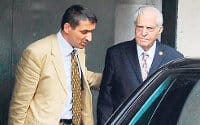 It has become a common strategy among those who expect to be prosecuted for corruption to hide behind slander. Latest in the series is a former intelligence officer who alleged CIA’s presence in world-wide web of Turkish Schools. His inference is based on a plea from a Turkish School official who merely asks for government support and gives the US and other countries as example. Disinformation at its best…
It has become a common strategy among those who expect to be prosecuted for corruption to hide behind slander. Latest in the series is a former intelligence officer who alleged CIA’s presence in world-wide web of Turkish Schools. His inference is based on a plea from a Turkish School official who merely asks for government support and gives the US and other countries as example. Disinformation at its best…
Former National Intelligence Organization (MİT) İstanbul Region Chairman Nuri Gündeş’s recent claims that CIA agents were working at Turkish schools opened by volunteers of the Gulen movement in Uzbekistan have been proven groundless through official documents which reveal that Gündeş distorted reality.
Gündeş made some groundless allegations about the Gulen movement, inspired by internationally respected Turkish scholar M. Fethullah Gülen, in a recently published book titled “İhtilallerin ve Anarşinin Yakın Tanığı” ( Close Witness of Revolutions and Anarchy). In the book he argues that CIA agents were working at Turkish schools in Uzbekistan under the guise of teachers, basing his claims on a speech at a 1997 conference held on the behalf of the Turkish schools around the world. He said the conference was organized by the Education Ministry to discuss problems faced by Turkish schools abroad and pointed to Mehmet Mesut Ata, a director of a Turkish school, as the source for his claims. Milliyet daily columnist Can Dündar also reported on Gündeş’s book and his allegations about Turkish schools, giving credence to them, in his Tuesday column. However, official records of the meeting clearly show that Gündeş’s claims are mere slander.
According to the records, in his comments on Turkish schools in Uzbekistan, Ata said: “I would like to deliver two proposals to the esteemed committee [of the Education Ministry on Turkish schools abroad]. First, high-level state officials, ministry officials in particular, should pay more frequent visits to these schools in order to maintain educational activities abroad. The second is that the US granted diplomatic status to 70 teachers it brought to Uzbekistan. If our state and embassy help us on the issue of diplomatic status [for Turkish teachers], we think the respectability of Turkish teachers will increase. We would also be pleased if Turkish Airlines [THY] agrees to help us with a ticket discount for Turkish teachers.”
During his speech, Ata continued to give examples from the US, which he said invites teachers working abroad to their home country periodically for seminars, saying the country also meets the transportation expenses of the teachers. “What we request from our state is to provide us with similar opportunities and to invite Turkish teachers working abroad, and their students, to Turkey free of charge,” he says.
Gündeş, however, seems to have distorted Ata’s remarks as he quoted Ata as saying: “The US granted diplomatic status to 70 teachers it brought to Uzbekistan. The majority of US teachers who are now in Uzbekistan with a diplomatic passport are working at schools of the Gülen community. Although they seem to be working as English language teachers, they work for the US intelligence services and continue to serve as agents for the implementation of US policies developed in the Pentagon. English language teaching is just their guise. There are 60 US teachers in Kyrgyzstan as well.”
The Gülen movement is a group of volunteers engaged in interfaith and intercultural dialogue inspired by the ideas of Gülen, a Turkish Islamic scholar well known for his teachings promoting mutual understanding and tolerance between cultures. One of the world’s most influential Islamic scholars, Gülen made the top of “The World’s Top 20 Public Intellectuals” list in the magazine Foreign Policy and Prospect in 2008. Now residing in the US, Gülen has pioneered educational activities in a number of countries, along with efforts to promote intercultural and interfaith activities around the world.
Who is Nuri Gündeş?
Gündeş, now 85 years old, has been accused of having links with organized crime networks. Former MİT Counterterrorism Unit head Mehmet Eymür said in the first MİT report he prepared in 1987, which exposed links between the police, state officials and the underground world, that Gündeş was involved in some illegal activities with infamous mafia leader Dündar Kılıç and then-İstanbul Police Chief Şükrü Balcı. Gündeş has recently been implicated in the Ergenekon case, an investigation into an illegal network suspected of planning to overthrow the government. Former Deputy Chief of General Staff Gen. Çevik Bir and Gündeş testified to prosecutors overseeing the Ergenekon probe as suspects last year. They were both asked about an alleged assassination plan against Prime Minister Recep Tayyip Erdoğan. Retired Gen. Bir, who is said to be the architect of the Feb. 28, 1997 unarmed military intervention that resulted in the resignation of a coalition government led by an Islamist party, and Gündeş, both of whose names appear on several documents seized during the probe into Ergenekon, testified after a secret witness in the probe said that Gündeş had sent him to Gen. Bir to discuss the assassination.
